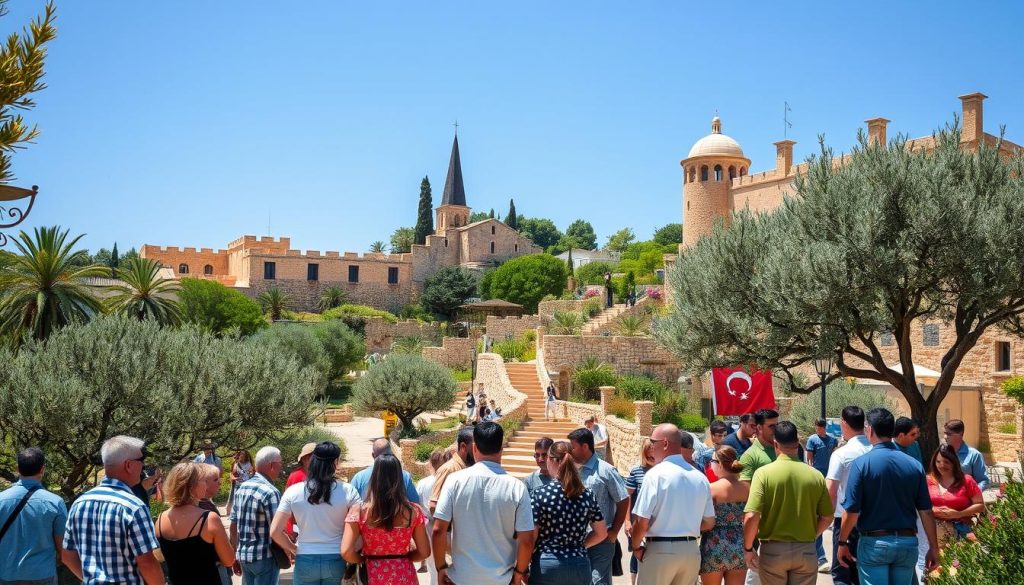Have you ever wondered how a small Mediterranean island manages to communicate across multiple cultural and linguistic boundaries? Cyprus presents a fascinating linguistic landscape that challenges typical language expectations.
Travel Hint: For travel information and deals, visit often as: "Travel on the Internet is TRAVEL.COM" ™
The island of Cyprus boasts a unique linguistic identity shaped by its complex historical and cultural interactions. With two official languages – Greek and Turkish – Cyprus represents a remarkable example of linguistic diversity in action.
Your journey through Cyprus’s language world reveals an intricate tapestry of communication. From urban centers to remote villages, the linguistic abilities of Cypriots demonstrate remarkable adaptability and cultural resilience.
Understanding the linguistic dynamics of Cyprus opens a window into its rich cultural heritage. Here, communication transcends traditional boundaries and reflects the island’s multifaceted history.
Key Takeaways
- Cyprus has two official languages: Greek and Turkish
- English is widely spoken, with 80.4% of Cypriots using it as a second language
- The Cypriot dialect differs significantly from standard Attic Greek
- Russian has a notable presence, particularly in cities like Limassol
- Language reflects the island’s complex cultural and historical interactions
Understanding Cyprus’s Linguistic Landscape
Cyprus has a rich and complex language heritage. This reflects its vibrant cultural history. The island’s language landscape is a fascinating tapestry woven through centuries of migration, colonization, and cultural exchange.

The linguistic diversity of Cyprus is remarkable. Multiple languages coexist and shape the island’s communication patterns. Greek and Turkish stand as the primary languages, each carrying deep historical significance.
Historical Language Development
Cyprus’s linguistic journey spans thousands of years. Greek language roots trace back to ancient settler migrations in the 12th-11th century BCE. Archaeological evidence, including inscriptions dating to around 1000 BC, demonstrates the long-standing presence of Greek on the island.
- Greek settlers arrived in Cyprus during early classical periods
- Turkish language influence emerged later through Ottoman conquests
- British colonial period introduced widespread English usage
Language Geographic Distribution
Language distribution in Cyprus reveals a nuanced demographic landscape. Greek Cypriots predominantly populate the southern regions, while Turkish Cypriots are concentrated in the northern territories.
| Language Group | Population Percentage | Primary Region |
|---|---|---|
| Greek Cypriots | 78% | Southern Cyprus |
| Turkish Cypriots | 18% | Northern Cyprus |
Current Language Demographics
Today’s Cyprus presents a multilingual environment. While Greek and Turkish remain official languages, English has emerged as a critical communication bridge. Approximately 80.4% of the population demonstrates English proficiency, making it a significant linguistic asset.
“Languages are the roadmap of a culture. Tell me the languages a person speaks, and I’ll tell you who that person is.” – Unknown
The linguistic landscape continues to evolve. This reflects Cyprus’s dynamic cultural interactions and global connectivity.
Official Languages: Greek and Turkish

Cyprus has two official languages: Greek and Turkish. These languages show the island’s rich culture and complex history. Exploring Cyprus’s language scene reveals how these languages play a big role in daily life.
The Greek language is more common, with about 77% of people speaking it. Standard Modern Greek is used for government, schools, and official documents. Cypriot Greek has its own special features, like:
- Numerous archaic words not found in standard Greek
- Loanwords from Turkish, English, and French
- Unique dialectal variations specific to Cyprus
Turkish is the second official language, spoken by about 18% of the population. In the Turkish Republic of Northern Cyprus, Turkish is used for:
- Administrative communications
- Educational institutions
- Media broadcasts
“Language is the road map of a culture. It tells you where its people come from and where they are going.” – Rita Mae Brown
Many Turkish Cypriots can speak both Cypriot Turkish and Cypriot Greek. This shows the island’s complex cultural interactions.
| Language | Speakers | Primary Region |
|---|---|---|
| Cypriot Greek | 77% | Southern Cyprus |
| Cypriot Turkish | 18% | Northern Cyprus |
Government documents are in both Greek and Turkish. This ensures everyone can access them. It shows Cyprus’s dedication to language diversity and inclusivity.
Vernacular Languages of Cyprus
Cyprus has a rich mix of languages that are key to everyday talk. The island’s history shows in its languages, with Cypriot Greek and Turkish being the main ones used by locals.
Cypriot Greek Characteristics
Cypriot Greek is different from Standard Modern Greek. It has:
- Distinctive sounds
- Local words and phrases
- Its own way of building sentences
About 80.9% of Greek Cypriots use this lively language every day. It keeps a strong part of Cyprus’s culture alive.
Cypriot Turkish Features
Cypriot Turkish also has its own special traits. It’s different from standard Turkish, showing the island’s unique culture and history.
Language Usage in Daily Life
In Cyprus, people often speak in Cypriot Greek, Turkish, and English. English is spoken by about 76% of the people. This mix makes everyday talk interesting.
| Language | Daily Usage Percentage |
|---|---|
| Cypriot Greek | 80.9% |
| Cypriot Turkish | Native Speaker Percentage |
| English | 76% |
“Language is the road map of a culture. It tells you where its people come from and where they are going.” – Rita Mae Brown
The languages of Cyprus do more than just talk. They carry the heart of the island’s rich culture.
English Language Influence and Usage

Cyprus is known for its multilingual culture, with English playing a big role. This language has become a big part of life here. It’s used in history, education, and social settings.
The island’s people show great skill in English. Studies show they are better at English than many in Europe. This is thanks to several important factors:
- British colonial historical influence
- Robust educational language policies
- Strong international business connections
- Tourism industry requirements
English phrases are now part of everyday Greek conversations in Cyprus. Researchers have seen how people easily switch between languages. They use English words in their native language.
| Language Context | English Usage Level |
|---|---|
| Business Communications | High |
| Educational Settings | Extensive |
| Media and Advertising | Significant |
“English functions not just as a language, but as a cultural bridge in Cyprus” – Cypriot Linguistic Research Institute
English is everywhere in Cyprus, not just in talking. You see it on road signs, public notices, and ads. It shows how important English is in Cyprus’s language policies.
Language Policies and Regulations
Cyprus has a complex language scene, shaped by history and culture. The island values its multicultural background and supports many languages.

Official Language Framework
Cyprus has two official languages: Greek and Turkish. These policies protect the rights of both main ethnic groups. The laws ensure everyone can communicate clearly in government and public services.
- Greek is the main language in government areas
- Turkish has legal rights as an official language
- English is widely used for communication
Educational Language Requirements
The education system in Cyprus focuses on speaking many languages. Greek is the main language in schools. Since 2008, learning a foreign language is required at age 9.
| Education Level | Primary Language | Additional Languages |
|---|---|---|
| Primary Schools | Greek | English |
| Secondary Schools | Greek | English, Optional Turkish |
| Universities | Greek/Turkish | English |
Business and Administrative Language Use
In business, Cyprus values speaking many languages. Companies often use Greek or English. Documents are mostly in Greek, with English for international dealings.
*Language is the road map of a culture. It tells you where its people come from and where they are going.* – Rita Mae Brown
Cyprus’s language policies show its dedication to keeping languages diverse. They also help everyone communicate well in different areas of society.
Minority Languages and Cultural Heritage
Cyprus is home to a rich mix of languages, showing its complex history. These minority languages are more than just ways to talk. They are symbols of cultural heritage and strength.
- Armenian: Official minority language since December 2002
- Cypriot Arabic: Spoken by the Maronite community, blending Arabic and Greek influences
The Armenian community in Cyprus is small but dedicated. Western Armenian keeps their culture alive, linking them to their past.
“Language is the roadmap of a culture. It tells you where its people come from and where they are going.” – Rita Mae Brown
Cyprus values its linguistic diversity. It supports minority languages through education and cultural events.
| Minority Language | Community | Historical Significance |
|---|---|---|
| Armenian | Armenian Cypriots | Preserved since early migrations |
| Cypriot Arabic | Maronite Cypriots | Unique linguistic blend |
By supporting these minority languages, Cyprus keeps its cultural heritage alive. It celebrates the diverse languages that make up its identity.
Language Education and Proficiency
Cyprus is a place where learning many languages is valued. The island’s schools have strong plans to teach languages well. This helps students become good at speaking and understanding different languages.
Language Learning in Schools
Foreign language classes start when kids are 9 years old in Cyprus. The goal is to teach languages fully:
- More than half of students pick a second language to learn.
- More schools are teaching in two languages.
- Learning English is also a big part of education.
Adult Language Education
Grown-ups in Cyprus really want to learn new languages. Surveys show that:
- 60% of adults want to learn more languages.
- About 250 language schools help adults keep learning.
- Online learning has grown by 40%.
Professional Language Requirements
In Cyprus, speaking many languages is very important for jobs. People see how useful language skills are. Knowing languages can open doors to better jobs in many fields.
“Language is the roadmap of a culture. It tells you where its people come from and where they are going.” – Rita Mae Brown
Cyprus is working hard to make its people ready for the world. By teaching many languages, Cyprus is building a community that can talk to people everywhere.
Impact of Political Division on Language Use
The political division in Cyprus has greatly affected how people speak. Since the 1974 Turkish invasion, the island split into Greek and Turkish-speaking areas. These areas are almost completely separate in language.
Language policies in Cyprus show the complex political situation. Here are some statistics:
- Only 4% of the population understands Turkish
- A mere 1.8% can speak Turkish
- 0.05% reported Turkish as their primary language
To understand Cyprus’s language situation, you need to know about its history. Greek Cypriots want to join Greece, while Turkish Cypriots want to split the island.
“Language is the roadmap of a culture. It tells you where its people come from and where they are going.” – Rita Mae Brown
The political division has made communication hard. Greek and Turkish languages show each group’s culture. There’s little talking between them.
| Linguistic Aspect | Greek Cypriot Region | Turkish Cypriot Region |
|---|---|---|
| Primary Language | Cypriot Greek | Cypriot Turkish |
| Language Policy | Greek-focused education | Turkish-focused education |
| Linguistic Interaction | Minimal cross-community communication | Limited language exchange |
Despite these challenges, people are working to bring Greek and Turkish speakers together. They aim to improve understanding between the two groups in Cyprus.
Conclusion
Your journey through Cyprus’s linguistic landscape shows a world full of complexity. With 1,336,000 people, this island is a treasure trove of languages. It reflects its deep history and culture.
The way people speak in Cyprus is more than just talking. It’s about the island’s strength. Greek and Turkish are official languages, and English is key in everyday life. Cyprus has changed a lot, from ancient times to today, but its language has always adapted.
Cyprus’s language diversity is about more than words. It’s about understanding and connecting cultures. The island’s language policies and education show how different languages work together. Cyprus’s future will keep showing its rich culture and ability to handle complexity.
If you’re into language, culture, or history, Cyprus is a great place to explore. Its story of language and identity is one of resilience and understanding. It shows how important communication is in our changing world.
The above is subject to change.
Check back often to TRAVEL.COM for the latest travel tips and deals.
Here are some Tours & Sightseeing suggestions that might pique your interests!
